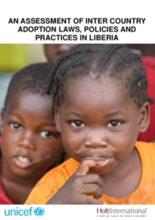This report presents the findings of an assessment conducted between 8 July and 22 August 2006 that gathered and analyzed information on inter-country adoption to support strengthening Liberia’s adoption laws and develop operating guidelines for adoption agencies. The assessment is part of Liberia’s obligation as a signatory to the United Nations’ Convention on the Rights of the Child and was collaboration between the Liberian Ministry of Health and Social Welfare, UNICEF, and Holt International Children’s Services.
The study found that Liberia’s adoption law fails to address the specifics of inter-country adoption (ICA), especially guidelines for internationally recognized practices as outlined by the Convention on the Rights of the Child (CRC) and Hague Convention on Protection of Children and Co-operation in Respect of Inter-country Adoption (hereinafter referred to as the Hague Convention). The primary failings in this regard are the absence of a central governmental authority responsible for regulating ICA activities and a lack of oversight of adoption agency practices. In particular, agencies must be licensed and only those who also provide family preservation services and show dedication to placing children with special needs should be allowed to practice.
As a partial result of this lack of oversight, many children who are not legitimately eligible are suspected of entering the adoption system through fraudulent means, mostly through false promises designed to deceive birth parents into relinquishing them.
Another consequence is that adoption records are either poorly kept or do not exist, and those that do were largely inaccessible by legitimate means. No one interviewed conceded knowledge of private attorney adoptions or showed an interest in either regulating or learning more about them.
Support for the investigation was also difficult to find. Most of those approached in Liberia, including government employees, were either hostile to the assessment, reluctant to participate, or feigned support and avoided delivering useful information. Outside of UNICEF, the most helpful were those in law enforcement and investigation.
Many people interviewed, including those in civil social service, were ill-informed about the pertinent issues surrounding adoption, both pro and con. A widespread belief among all those interviewed is that the government colludes with adoption agencies for profit at the expense of family and children’s rights. Further, regardless of their attitudes, many government employees lack the skills, administrative, and material support to be effective in their positions.
The study also found many individuals and some organizations, however, who were sincerely concerned about providing support for at-risk children and families and that even given limited resources the government has taken steps to meet its obligations under the CRC. Maintaining the integrity of the family as the best way to support children is one of the basic tenets of both the CRC and the Hague Convention. Domestic adoption and foster care are secondary solutions and ICA last. Absent official support, the individuals who act on these principles often take the initiative to provide the necessary services without promise of compensation. Thus was revealed a core of committed citizens whose national pride and concern for those without means the government can mobilize with the appropriate leadership and support drawn, if necessary, from the global community of nations that support children’s rights.

